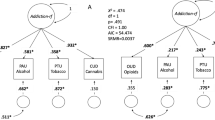Abstract
Abnormalities in the dopaminergic reward pathways have frequently been implicated in substance abuse and addictive behaviors. Recent studies by Self and coworkers have suggested an important interaction between the dopamine D1 and D2 receptors in cocaine abuse. To test the hypothesis that the DRD1 gene might play a role in addictive behaviors we examined the alleles of the Dde I polymorphism in three independent groups of subjects with varying types of compulsive, addictive behaviors — Tourette syndrome probands, smokers and pathological gamblers. In all three groups there was a significant increase in the frequency of homozygosity for the DRD1 Dde I 1 or 2 alleles in subjects with addictive behaviors. The DRD1 11 or 22 genotype was present in 41.3% of 63 controls and 57.3% of 227 TS probands (P = 0.024). When 23 quantitative traits were examined by ANOVA those carrying the 11 genotype consistently had the highest scores. Based on these results, we examined the prevalence of the 11 genotype in controls, TS probands without a specific behavior, and TS probands with a specific behavior. There was a progressive, linear increase, significant at α ≤ 0.005 for scores for gambling, alcohol use and compulsive shopping. Problems with three additional behaviors, drug use, compulsive eating and smoking were significant at α ≤ 0.05. All six variables were related to addictive behaviors. In a totally separate group of controls and individuals attending a smoking cessation clinic, and smoking at least one pack per day, 39.3% of the controls versus 66.1% of the smokers carried the 11 or 22 genotype (P = 0.0002). In a third independent group of pathological gamblers, 55.8% carried the 11 or 22 genotype (P = 0.009 vs the combined controls). In the TS group and smokers there was a significant additive effect of the DRD1 and DRD2 genes. The results for both the DRD1 and DRD2 genes, which have opposing effects on cyclic AMP, were consistent with negative and positive heterosis, respectively. These results support a role for genetic variants of the DRD1 gene in some addictive behaviors, and an interaction of genetic variants at the DRD1 and DRD2 genes.
Similar content being viewed by others
Author information
Authors and Affiliations
Rights and permissions
About this article
Cite this article
Comings, D., Gade, R., Wu, S. et al. Studies of the potential role of the dopamine D1 receptor gene in addictive behaviors. Mol Psychiatry 2, 44–56 (1997). https://doi.org/10.1038/sj.mp.4000207
Received:
Revised:
Accepted:
Issue Date:
DOI: https://doi.org/10.1038/sj.mp.4000207
- Springer Nature Limited
Keywords
This article is cited by
-
DRD and GRIN2B polymorphisms and their association with the development of impulse control behaviour among Malaysian Parkinson’s disease patients
BMC Neurology (2015)
-
Addiction-related genes in gambling disorders: new insights from parallel human and pre-clinical models
Molecular Psychiatry (2015)
-
Case–control association analysis of Dopamine receptor polymorphisms in alcohol dependence: a pilot study in Indian males
BMC Research Notes (2013)




